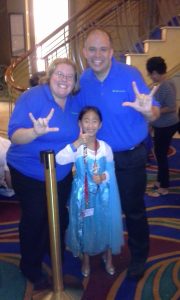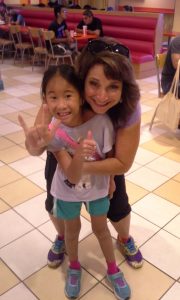By Joy Santos
Traveling was a huge part of my childhood, and it is something that I would like for my daughter, Teanna, to experience in hers. We make travel plans as much as we can, be it quick weekend getaways, camping and road trips, or a well deserved longer vacation. At first it felt daunting. I worried about things all parents worry about when going away. How do I keep my child entertained? What will I need to bring? What safety measures need to be put in place? My daughter’s Deafness added an extra element that I felt I needed to learn about and prepare for.
Our very first trip was a weekend of camping when Teanna was 3½ years old. Since she had never been camping, I felt it was important to let her know what we would be doing and what to expect, as well as make sure that she knew and understood the safety rules. She had only been identified as Deaf and received a cochlear implant (CI) the previous year, and we were both also learning American Sign Language (ASL) together.
To prepare for this trip, I explained what we were doing to her as best as I could in ASL. Her language and vocabulary were quite limited at the time, as was my Sign Language, so I gave her the basics – “camping,” “outside,” “fire,” “hot,” and of course “marshmallow”! I supplemented these with pictures I found on the internet of what a campsite setup would look like outdoors, what a campfire looks like, and bugs we might see. We also had a lot of camping practice in the living room, and watched YouTube videos on how to build a campfire while discussing safety with using it.
I reiterated that while she is allowed to play and explore, she should always be near enough so that I could see her, and she can see me. I felt it was a good idea to enforce safety rules visually by incorporating them into her play i.e., scenarios with dolls and finger puppets. We also practised her physically looking back regularly to make sure I was still in her sight, if she chose to wander off and play. When it came time to go, she was definitely prepared, and I felt confident that she understood the safety rules.
Sure enough, when we arrived at the campsite, she already seemed to be familiar with what to expect. She was excited to see the fire pit, and helped collect twigs and dry leaves for kindling. She knew to stay a safe distance from it once it was lit, and enjoyed her first campfire roasted marshmallow. Overall, I felt that the camping trip was a success!
Fast forward to now; Teanna is 8 years old. Since then, we have been on a few plane rides, a cruise, travelled by train, and, of course, have gone on numerous camping and road trips. To this day, I still prepare her visually ahead of time, and always enforce safety measures.
This includes usually letting travel crew/staff know that she is Deaf as a safety precaution. If an alarm goes off, for example, and she does not have her CI on, she will not hear it. Also, the staff then knew that they need to show her where to go and what to do in the case an emergency, such as an evacuation, as opposed to telling her. I do the same for ride attendants at theme parks for the same reasons. I have not encountered anyone who was not accommodating to us. One time, a flight attendant even brought a safety demo kit to us so Teanna could see the oxygen mask and life jacket up close, and physically walked around the plane to show her where the emergency exits were located.
What to pack (these are our essentials for a child with cochlear implants but much of this applies to other hearing technologies as well):
- Extra cochlear implant batteries
- Cochlear implant battery charger
- Waterproof airtight container: something to store cochlear implants and batteries. A plastic food container works well.
- A container of silica gel beads: you can buy these in loose form from hardware stores or online, or you can save the packets of desiccant you find inside packaging. This is useful for keeping cochlear implants dry.
- A hat to protect gear from the elements, and keep it secure. We like using Nammu hats, which can be purchased online at http://www.nammuhats.com.
- A whistle. I taught Teanna to use a whistle should she ever get lost, is unable to see me, or in an emergency situation. I feel this would be quite useful in places like a busy airport or train station where we could easily lose each other.
- Any other equipment to keep cochlear implants secure and dry e.g., clips, headbands, waterproof casing.
ASL Interpreting / Access / Discounts
 So far, we have only been able to take advantage of ASL interpreters provided for us, as well as Disability discounts, during our travels to the United States. For example, we were provided interpreters for the duration of our cruise with Disney Cruise Lines. They were there to interpret the performances we attended, as well as any interactions Teanna had with other passengers (for example, with other children at the kid’s club) or crew, such as during our dinner seating or any organized children’s activities. This helped immensely with her autonomy, and it allowed me the peace of mind that made for a relaxing vacation.
So far, we have only been able to take advantage of ASL interpreters provided for us, as well as Disability discounts, during our travels to the United States. For example, we were provided interpreters for the duration of our cruise with Disney Cruise Lines. They were there to interpret the performances we attended, as well as any interactions Teanna had with other passengers (for example, with other children at the kid’s club) or crew, such as during our dinner seating or any organized children’s activities. This helped immensely with her autonomy, and it allowed me the peace of mind that made for a relaxing vacation.
 Theme parks and attractions in the USA typically provide ASL interpreters if they are given notice ahead of time – two to three weeks will usually suffice. Websites typically have information on how to arrange this, or you can call the park or attraction directly. We were provided an interpreter for a few hours when we visited Universal Studios Hollywood. She interpreted the tram ride that toured the studios, as well as the performances. We also received the added perk of a passes that allowed us priority access to some rides.
Theme parks and attractions in the USA typically provide ASL interpreters if they are given notice ahead of time – two to three weeks will usually suffice. Websites typically have information on how to arrange this, or you can call the park or attraction directly. We were provided an interpreter for a few hours when we visited Universal Studios Hollywood. She interpreted the tram ride that toured the studios, as well as the performances. We also received the added perk of a passes that allowed us priority access to some rides.
There are often discounts towards admission for a person with a disability and their companion. I have had to take the initiative to ask for these, though, since sometimes Teanna’s disability is not apparent. We have used this for park admission, as well as train tickets with Amtrak in the USA while booking online.
I sometimes felt a little apprehensive to ask for these “perks” but I have learned that it never hurt and, in fact, has been of great benefit to us. I was quite blown way by interpreter being provided for us despite Teanna being a young child. Having these advantages made our travels that much more worthwhile, and Teanna enjoys the experiences and newfound knowledge. At Universal Studios, for example, she was very keen to learn about special effects. Because the show was interpreted, she was fully able to grasp all the information, as well as have the independence to ask questions and have them answered in the language she is most fluent in.
I look forward to more adventures with my little one, as well as learning about Deaf Culture around the world!

